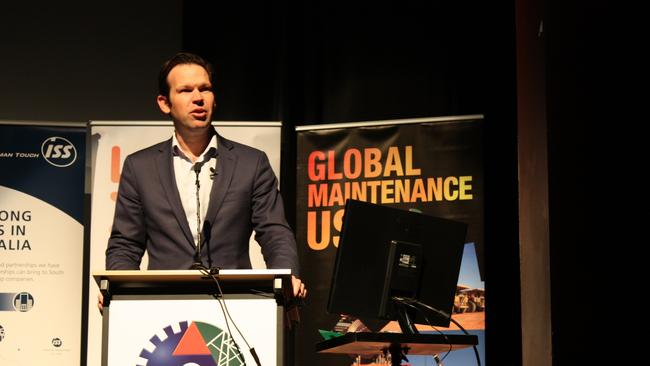Gas in South East and oil in Great Australian Bight needed for cheaper prices and energy security, says Canavan
A day after plans to use seismic testing in the Great Australian Bight were delayed, the federal energy minister says the hunt for oil and gas remains vital to the country’s energy security.
- PGS delays search for Bight oil as investors pull funds
- What dwells beneath: Great Australian Bight’s hidden treasures
- Fight for the Bight: Why drilling divides South Australians
Exploring for gas and oil in the Great Australian Bight is important to restore the country’s energy security, while there is no scientific evidence to support a fracking ban in the state’s southeast, Resources Minister Matt Canavan says.
During a visit to Port Pirie yesterday, Mr Canavan said he had spoken to Premier Steven Marshall and state Energy and Mining Minister Dan van Holst Pellekaan about getting more gas into the system.
“We want to work closely with state and territory governments,” Mr Canavan said.
He said exploring the Bight was a chance to increase Australia’s energy production and reduce reliance on other countries.
“On the eve of (the 2001 US terror attacks) September 11, we could produce 96 per cent of our petroleum needs in this country,” he said.
“Not all of it was refined here, a lot of it was exported, but if push came to shove we had 96 per cent of our needs in raw form.
“With the decline in the Bass Strait, that’s dropped to less than 50 per cent.
“You know, it’s great to be investing in submarines here in SA, but they don’t run on solar and wind.

“We’re going to need oil. And if things do go pear-shaped, it would be good if we could produce our own oil. The Great Australian Bight does have that opportunity.”
He was optimistic Norwegian company Equinor’s exploration drilling of The Bight, which is yet to gain approval, would proceed.
Mr Canavan was in Port Pirie for a mining and energy conference focused on the Upper Spencer Gulf.
But he was happy to talk about the state’s wider energy issues, including fracking.
He told The Advertiser there was no scientific basis for bans on fracking to extract gas, such as the one the South Australian Government had introduced in the southeast.
“Fracking has been used for decades in Queensland’s Surat Basin and, indeed here in SA in the Cooper Basin, without causing any harmful issues,” Mr Canavan said.
However, he accepted gas development could not simply occur anywhere as there could be social or other factors to consider.
He said Victoria’s ban on all onshore gas development was “nonsensical”, and NSW needed to finalise an assessment of a Santos project in the Narrabri region, which could meet half that state’s needs.
Mr Canavan said gas prices had increased dramatically over the past decade, but blaming this on gas exports from Queensland — as many commentators have done — was simplistic.
He said in the Bass Strait, off Victoria’s coast, there was very little oil left, and the remaining gas was poor quality with lots of impurities and therefore costly to produce.
“There is nothing any government, any politician anywhere, can do about geology,” he said. “That’s set in stone, literally.”
Mr Canavan said there were three key weaknesses in the resources industry at present:
A LACK of major mineral discoveries for many years, which the Federal Government was trying to address with incentives such as the $100 million Exploring for the Future program.
AUSTRALIA falling behind world standards in the time taken for assessment and approvals.
THE HIGH cost of energy being prohibitive, especially for processing minerals.
